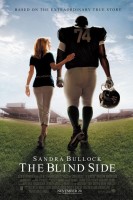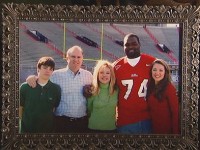I sometimes wonder why so much of what is considered “good literature” for ourselves and for students has to be dark, depressing, or unhappy. I’m not against stories in which something bad happens, but knowing that bad news seizes and clings, while good news slides right off us, I like to prime myself with uplifting stories (and in case you’re wondering, far more good things happen in a day than bad– it’s just that we give more weight to the bad).
One uplifting story, The Blind Side, is  my new favorite book. My book group knows because they are reading it with me (my second time) this month. I like it because it is well-written, tells the story of a boy with a difficult life who finds his way to success, and tells the story of one family’s kindness and generosity.
my new favorite book. My book group knows because they are reading it with me (my second time) this month. I like it because it is well-written, tells the story of a boy with a difficult life who finds his way to success, and tells the story of one family’s kindness and generosity.
While I know some would not consider this “good literature,” I think The Blind Side would be a terrific book to add to a high school (perhaps middle school) reading list. If you haven’t read it, let me just point out that gore, personal hardship and villains keep it from being a cotton-candy story. There’s plenty to absorb and discuss.
A number of questions came to my mind as I read and it occurred to me that there would probably be a discussion guide online where I could find interesting questions for our book group discussion. What I found was a mixed bag. The publisher had (in my opinion of course) some great questions and some poor questions.
One of the poor questions:
#3-” When Michael Oher arrived at Briarcrest Christian, he had very little in the way of education. What in his life failed him the most? His mother? The educational system? Social services? Himself?” …
Really, do we have to read him as a victim? Yes, his life was far from ideal and yet he found a way through. How did he do it?
A few of the great questions :
#4- “Michael Oher, despite his poverty and homelessness, never joined a gang, nor did he get involved in criminal activity. Why? What stopped him from taking that path?
#5- Before coming to Briarcrest, Michael Oher had no traditional support network, yet a number of people did help him out — by letting him sleep on their floors, bringing him to Briarcrest Christian, allowing him to enroll in the school, etc. Why did they help him?
#7- Teachers at Briarcrest discovered that Michael Oher was not stupid, but rather had trouble learning in a classroom. What does that mean? What is the difference between stupid and ignorant? Are there any things that you find difficult learning in a “standard” environment?”
Here are 8 questions I’ll add to our discussion:
– How did Michael find his way to people who would help him?
– What evidence is there that Michael had enough love in childhood to keep him going?
– What redeeming qualities do you see or imagine in Michael’s mother, based on his story?
– What are some of Michael’s finest personal qualities?
– How did Michael’s (unspoken) vision of being the next Michael Jordan help him?
– What attributes do you see in Michael Oher that enabled him to remain peaceful in an environment where others did not?
– In what ways does Michael’s story give you hope for yourself?
– How does Michael’s story give hope to other students (even wealthy, suburban kids)?
No matter what my book group thinks of the book– or the questions– just asking them makes me feel inspired by Michael’s story.
